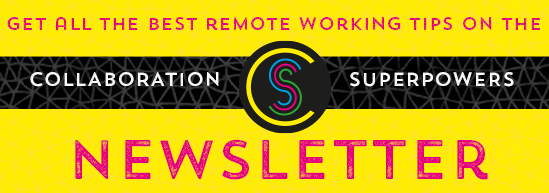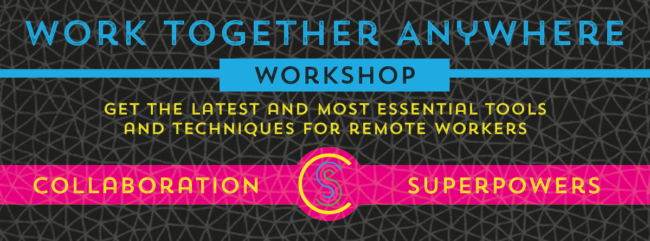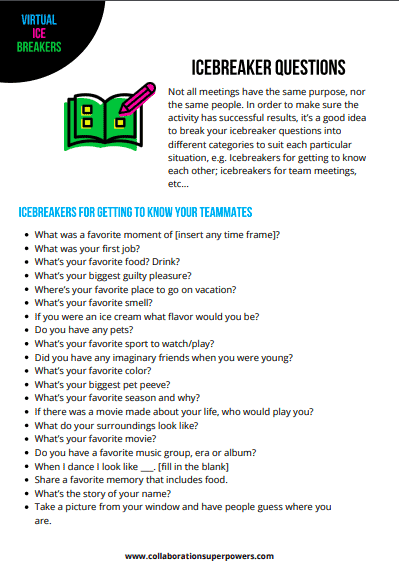Nowadays it seems that more often than not we’ve got our eyes glued to the screen—whether it’s our laptops, our phones, or our tablets—technology has made it really easy to stay connected.
So in a world where we’re always “on”, how do we better manage work-life fusion in order to avoid burnout? We need the occasional digital vacation.
A digital vacation is a retreat from the modern-day technology madness. It’s a time for setting aside our electronics and focusing on other things. While technology is important and even has the potential of opening up new worlds, it’s also essential to go offline now and again to let the brain reboot.
Subscribe to the Collaboration Superpowers Podcast on iTunes or Stitcher.
Signs its time to disconnect
- You start to feel frenzied and overwhelmed with everything you do.
- You feel overly tired and/or get tension headaches
- You find it difficult to focus for long periods of time
If you recognize any of the above symptoms, you may need a short break. And if you recognize all the symptoms, then it’s time for a digital vacation.
Everyone has a different idea of what a vacation looks like, so think about what puts you in a relaxed state. If you don’t know what you need to shut off, here are some ideas that may help:
EXERCISE — Moving your body on a daily basis and being outside can be one of the best things you can do for yourself. Whether it’s going for a run, a brisk walk, or strolling in the sun, being in the open air induces relaxation and clears your mind.
SLEEP — We all know sleep is necessary, but did you know it’s also critical for brain detoxification? When we sleep, cerebral spinal fluid is pumped through our brain’s tissues and flushes waste from the brain back into our body’s circulatory system and into the liver, where it’s ultimately eliminated. This is why after eight hours of sleep one usually wakes up with a clear head. Without enough sleep, toxins can build up in the brain just like plaque in our arteries, and wreak havoc on our health.
TRAVEL — Getting away is sometimes the best way to gain perspective. It can also help you to appreciate your favorite home routines and simple pleasures even more.
UNPLUG — What better way to disconnect than to unplug your electronics? Try going offline for a day or week, or alternating days. You can even find a digital detox retreat online for those of you who really need help going offline.
UNSUBSCRIBE — Stop sifting through the junk mail. If you’re receiving a bunch of emails that don’t need to be opened, it’s time to unsubscribe.
SAY NO — There is this fear of letting go and not getting everything done and always needing to do more. Saying no doesn’t mean doing less. It means more time to better focus on what’s already on your plate.
It’s so important to sign off from time to time in order to let the mind wander and give it some room to breathe. The world will go on without us, and it will be there when we get back from our digital vacations. Many of us have a fear of missing out on things, but we have to remember to go out and have experiences in the first place.
Podcast production by Podcast Monster
Graphic design by Alfred Boland
More resources
Original transcript
Welcome to the Collaboration Superpowers podcast. My name is Lisette and I’m interviewing people and companies doing great things remotely. Welcome to another episode, everyone. Today we’re going to talk about something particularly near and dear to my heart right now, the digital vacation. And the reason that it’s so near and dear to my heart right now is that at the time of this recording, I am two days away from going on a vacation. And man, do I need it. It’s been months and months since I’ve really taken a proper break, and I’ve been working really hard this summer to get the book done and giving tons and tons of workshops. It’s really been the summer of workshops, which is really great. Don’t get me wrong. No complaints here, but it’s definitely time for a break. And it got me thinking. We take vacations to get away from it all and to rest and to see new things, but a digital vacation is something slightly different. It’s a retreat from technology. Knowledge workers do spend a lot of time, day and night, in front of their screens. And those of us who work remotely can work on projects from anywhere in the world. So we tend to work a lot at all hours of the day. And I think that freelancers in particular really have the perfect storm for not being able to turn off because we’re either hustling for work or we’re busy working on a client project. And on top of that, we tend to be working on things that we really like doing, so that makes it even harder to turn off because in reality, we don’t really want to. So as I’m going on vacation, I’m thinking, “Oh, man, this vacation is really healthy.” And then it also got me thinking about how much technology do I really want to bring on this vacation and why is it so hard to turn off all the screens. When I read about hyperconnectivity and what being online does to us, I almost always read about some form of Internet addiction and how it’s becoming more and more common and treatable in some parts of the world. And it got me thinking that yeah, I actually feel the addictive quality myself if I’m honest. I mean you’ve heard me talking on Pilar Orti’s 21st-century work-life podcast and on this podcast as well about how I’ve got this morning routine where I don’t check my phone first things in the morning. Well, let me tell you, I totally slip and I’m back to checking my phone first thing in the morning. So yeah, it’s hard to stick to our own boundaries that we set for ourselves. Now I’m personally a big fan of… I don’t want to call it depriving because that seems like such a strong word, but I’ll say I’m a big fan of depriving ourselves and going to an extreme in order to find balance. For example, I will occasionally do a 24 to 48-hour fast where I don’t eat anything for that amount of time. And what that does is just reset the way that I think about food. So this idea of a digital vacation where we turn all of our devices off, which is maybe extreme in certain circumstances because it’s okay to be connected. I mean I’m not trying to be anti-tech here. I along with many people love technology. I love being connected with my friends. I love to be able to show people what I’m talking about by doing it through a video or some sort of a picture that I can show online. I mean having the phone around and having our tablets around is awesome. I ask myself how many hours per day I spend staring at a screen of some kind or how often I check my phone. It quickly becomes apparent that it is definitely an extreme.
And going to the other side of the extreme is not a bad way to find balance again. So what are the signs that we really need a digital vacation? Well, I don’t know what they are for you, but I know that for me, I need a digital vacation when I start to feel frenzied, overwhelmed with everything that I have to do, or stuck. Overly tired is usually a sure sign. So if I’m really tired and I’m unfocused for long periods of time, then I know that I need a digital vacation. So if you recognize any of those symptoms, you may also need a short break. And if you recognize all of those symptoms, then I would start making a plan. Everybody is going to have their own form of a digital vacation, and the advice that I get from the interviews that I’ve done is to do something that works for you. So, for example, try going offline one day a week or try alternating days or try one of these digital detox retreats that you can find online for people who really need help going offline. It’s very difficult to break our regular habits, so whatever will work for you, do that. For example, last year, I was invited by some of my friends to go on a high, Alpine vacation. So we camped at a high-altitude camp side above 1600 meters which meant that it was really cold all the time and there was no electricity or running water at the campsite, which seemed like a perfect opportunity to try out a digital vacation. And it was great. I really focused on the climbs and the hikes that we were doing, preparing for those, resting at night, hanging out with my friends. And after the first day, I found that I didn’t really miss all those tweets and what was going on online. It was good to just take a break and be offline. So if you’re a knowledge worker or a remote worker in particular and it’s been more than a few months since you’ve gone offline or away from a screen for 24 hours, then it’s probably time. There is this fear of letting go and not getting everything done and wanting to really plow through the task list continuously. But it is really good to get offline and to let the mind wander and to give it some room to breathe. The world will go on without us, and it will be there when we get back from our digital vacations. I know we all have a fear of missing out on things, but we have to remember to go out and have experiences in the first place. So think about where will you go on your digital vacation.
All right, everybody, that’s it for this week. Thank you so much for listening. If you like what you hear, then please leave us a review on either iTunes or Stitcher. It really helps. And I’d love to know what you like about the podcast. And if you want to tell me about your digital vacation, all the better. You can find all the contact information you need at collaborationsuperpowers.com. A huge thanks to the reliable and awesome producer of this podcast, Nick, the podcast monster. You can hire him to make you a star at podcastmonster.com. And a big thanks to Alfred Boland, the dazzling graphic designer for Collaboration Superpowers. You can hire him to make you look cool at bolanden.nl. All right, everybody, until next week, take a break and be powerful.




